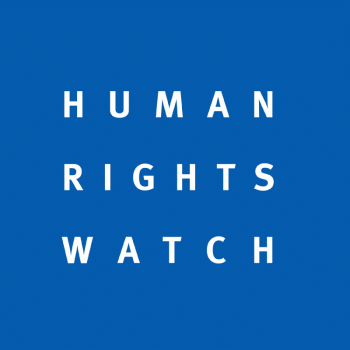Human Rights Watch: Conviction of Rights Defender a Blow for Rule of Law
The conviction of the Belarusian human rights defender Ales Bialiatski
on charges of tax evasion on November 24, 2011, and his prison sentence
of 4 years and 6 months with confiscation of all assets were unjustified
and politically motivated, Human Rights Watch said today.
The Belarusian authorities should drop their case against Bialiatski so
that he can be released promptly. Bialiatski said he will appeal the
verdict, and the appellate court should overturn the guilty verdict.
“Ales Bialiatski’s conviction is a disgraceful example of abusing the courts for political ends,” said Hugh Williamson,
Europe and Central Asia director at Human Rights Watch. “If you scratch
just below the surface, the trial had next to nothing to do with tax
evasion and everything to do with the Belarusian government trying to
silence someone who for many years dared to help victims of abuse.”
Bialiatski, head of Viasna Human Rights Center, has been in custody since his arrest on August 4.
Tax-evasion charges against Bialiatski stemmed from his use of his
personal bank accounts in Lithuania and Poland to receive funding from
international donors for human rights work in Belarus. Human Rights Watch said that the Belarusian authorities created many obstaclesto
prevent human rights groups like Viasna from operating in compliance
with the law, forcing them into a legal limbo that the government
exploits to punish them. Human Rights Watch has repeatedly called on the
prosecution to withdraw the charges.
The judge found Bialiatski guilty of large-scale tax evasion on his
personal income, under article 234.2 of the Criminal Code of Belarus.
The defense contended that Bialiatski used the money on his accounts in
Lithuania and Poland to support Viasna’s human rights work and that it
did not amount to personal income.
Evidence presented at trial indicated that the criminal investigation
into Bialiatski’s financial activities was initiated after the KGB, the
Belarusian secret service, in October 2010 received an anonymous
letter alleging that Bialiatski was concealing his income and receiving
foreign aid to finance ”radical opposition.” In February, the
prosecutor’s office summoned Bialiatski and issued him an official
warning that his human rights work was “in contradiction to Belarusian
law.”
Lithuanian and Polish authorities released Bialiatski’s bank
information to the Belarusian government, but then publicly apologized
and suspended bilateral legal assistance treaties with Belarus.
A Human Rights Watch researcher who monitored the trial also noted
irregularities in the trial proceedings against Bialiatski.The
prosecution’s case rested mainly on the fact that Bialiatski had
personal accounts opened in Lithuania and Poland, which he allegedly
concealed from the Belarusian authorities. Bialiatski’s bank account
details from Lithuania and Poland were presented in a case file in the
form of uncertified copies of bank printouts, whereas under Belarus law,
certified copies are normally required for documents to be legally
admissible evidence.
Likewise, the prosecution successfully admitted into evidence alleged
copies of private email correspondence from one of Bialiatski’s
colleagues. The prosecution then contended that the emails proved that
the colleague was involved in concealing Bialiatski’sincome.
However, the prosecution did not establish that it had the necessary
legal authority to conduct surveillance of email exchanges, as required
by Article 13 of the Belarusian Law on Investigative Activities.
Therefore, normally such material could not be considered as lawfully
obtained and, pursuant to Article 105 of the Criminal Procedure Code of
Belarus, should not have been admitted into evidence.
In court the defense noted that during pre-trial questioning two
witnesses from the local tax inspectorate gave answers that were
identical to the point of grammatical mistakes. The answers were
accepted into evidence.
The prosecution also referenced a DVD obtained by the investigation
that it alleges contained files incriminating Bialiatski. However, the
DVD was not given to the defense counsel before or during the hearing,
and was missing from the case file. Under Article 350 of the Belarusian
Criminal Procedure Code, a verdict must be substantiated and based
solely on the evidence that was presented during the hearing.
Some documents admitted into evidence were not translated from
Lithuanian and Polish or were translated at the last minute, which
undermined Bialiatski’s capacity to conduct an effective defense.
Representatives of a number of international human rights
organizations, including Human Rights Watch, the International
Federation for Human Rights (FIDH), Civil Rights Defenders, the Human
Rights House Foundation, the Norwegian Helsinki Committee and Frontline,
were unable to obtain visas to travel to Minsk for the trial.
“The trial of Ales Bialiatski was a show trial, predicated on
politically motivated charges, where what was sought was a jail sentence
for an outspoken critic, not a good faith desire to enforce a tax
code,” Williamson said. “This is a low point for the human rights
movement in Belarus.”
Background
Viasna Human Rights Centre was established in Minsk in the wake of
opposition protests in the spring of 1996. Its main areas of work
include election monitoring, human rights education and promotion of
democracy in Belarus as well as providing assistance to political
prisoners.
Viasna is one of the leading organizations in Belarus that provided
financial and legal aid for political prisoners and members of their
families in the wake of a massive government crackdown on opposition in
December 2010 and the following months. The authorities withdrew
Viasna’s registration in 2003, and have routinely denied it registration
since.
Under Belarusian law, participation in and funding of an unregistered
political party, religious organization, or public association is a
criminal offense punishable by a fine or imprisonment for up to two
years. In October 2011, the European Commission for Democracy Through
Law (Venice Commission) issued an opinion concluding that this measure
violates civil and political rights protected under the International
Covenant on Civil and Political Rights and European Convention on Human
Rights. The commission stated that the provision “not only restricts
freedom of association but also freedom of opinion and expression to an
unjustifiable degree.”


















